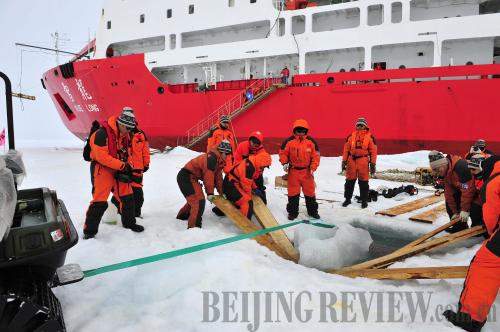|
 |
|
POLAR PIONEERS: Members of a Chinese scientific expedition team make a hole in Arctic ice on August 10, 2010 to conduct underwater acoustic and optic research (ZHANG JIANSONG) |
At the Seventh Arctic Council Ministerial Meeting in May 2011, the council adopted the Agreement on Cooperation on Aeronautical and Maritime Search and Rescue in the Arctic, the first legally binding agreement since the council was established in 1996. This progress was attributable to policy coordination among major Arctic states such as the United States and Russia.
The meeting's final document also stated countries intending to become observers at the Arctic Council must recognize council members' sovereignty and jurisdiction over the Arctic. Observers' rights are limited to participation in scientific research in the region and the contribution of funds for certain projects. By restricting observers' rights and modifying observer application procedures, the Arctic Council has raised the political threshold for non-Arctic states to participate in Arctic governance.
But pressing trans-regional issues such as Arctic navigation, resource development and environmental protection necessitate cooperation between both Arctic and non-Arctic states. It is unimaginable that non-Arctic states will remain users of Arctic shipping routes and consumers of Arctic energy without playing a role in the decision-making process, and an end to the Arctic states' monopoly of Arctic affairs is now imperative.
China, India, Japan, South Korea and the EU have made strong appeals for participation in Arctic affairs. Although the Arctic states are unlikely to share their leadership and decision-making power with other countries in the foreseeable future, the need to work together with non-Arctic states will grow.
An active player
China supports the UNCLOS and other international conventions governing the Arctic. At the same time, it is fully aware that the current governance system has not resolved disputes in the Arctic and takes the position that many aspects of the system need to be amended in light of specific problems in the region.
China has closely followed the disputes among the Arctic states over outer continental shelf demarcation. It has called on the countries concerned to settle disputes based on the UNCLOS and scientific data so as not to allow lingering conflicts to hinder progress in international cooperation in the Arctic.
While demarcating their outer continental shelves, these countries should not only handle relations with neighboring Arctic states in a proper way but also take the Arctic's importance to mankind into consideration. The Arctic states should strike a balance between their national interests and the common interests of the international community.
China is of the view the world community should devise more focused rules on navigation safety and environmental protection in the Arctic based on current conventions. In terms of redressing defects in the current Arctic governance system, China will play a critical role given its extensive interests in Arctic research, environmental protection, resource exploration and navigation.
It will intensify Arctic expedition efforts while engaging in the discussions of topical issues such as navigation, environmental protection, tourism and resource exploration.
China plans to make itself heard before arrangements are made, so that its views can be incorporated into any arrangements. To that end, it will strengthen cooperation and exchanges with North European countries such as Iceland, Norway and Sweden. As a major developing country, China will give prominence to mankind's common interests and shared concerns in its proposals on Arctic governance.
China has recently unveiled a plan for polar expedition from 2011 to 2015 and launched a number of research projects—moves that are expected to give a boost to its polar studies program. Chinese researchers will reach out to leading scholars worldwide for academic exchanges. All these efforts aim to help shape a medium- and long-term development strategy for the Arctic.
The author is an assistant research fellow with the Shanghai Institutes for International Studies
The Arctic Council
The Arctic Council was established as a high-level intergovernmental forum in 1996. It provides a means for promoting cooperation, coordination and interaction among the Arctic states, with the involvement of the Arctic indigenous communities and other Arctic inhabitants on common Arctic issues, in particular issues of sustainable development and environmental protection.
- Member states: Canada, Denmark (including Greenland and the Faroe Islands), Finland, Iceland, Norway, Sweden, Russia and the United States
- Permanent observer states: France, Germany, the Netherlands, Poland, Spain and the UK
(Source: www.arctic-council.org) | 